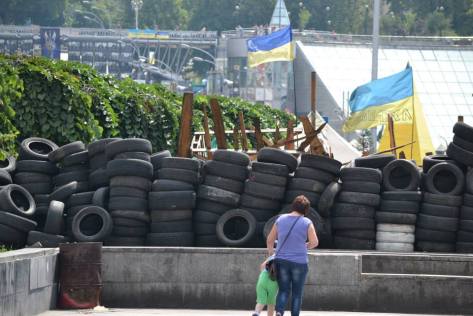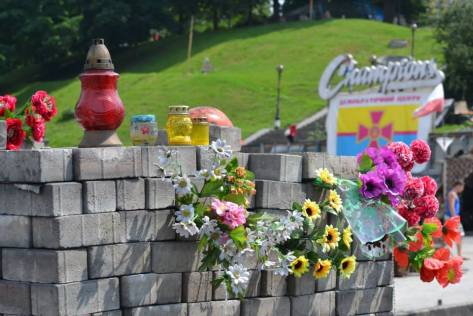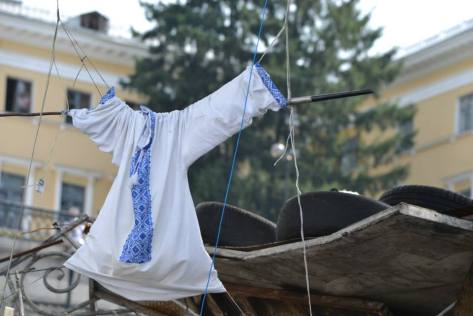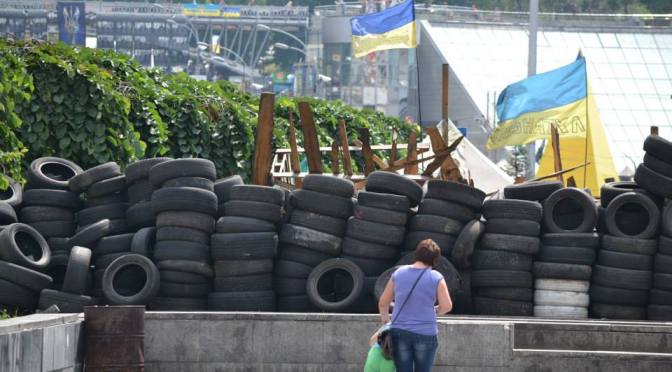Tanya Dzekon
Staff Writer
Upon my arrival to Kiev, I was greeted by an authentically Ukrainian summer – interchanging skies of sunshine and lighting. It happens so quickly that it seems like someone is switching slides in an old Kodak projector from above.
I was born in Vinnitsa, a town about 200 miles west of Kiev, which was famous for its chocolate and kielbasa factories during the Soviet Union. That’s where my grandmother – the one that cooks – is from. She made a variety of Ukrainian and Russian dishes for me while I stayed with her and my grandfather. Borsht soup, Pelmeni, and Beef Stroganoff were all cooked on an electric stove. This new piece of kitchen technology was a recent purchase, because the gas has recently been turned off in their home.

In Ukraine, it’s currently impossible to live a life untouched by the war and political crisis. My grandparents didn’t have gas in their home because Russia cut off Ukraine’s gas supply in a politically motivated move, and local governments are trying to conserve as much gas as possible during this difficult Summer to get ready for an even more difficult Winter. A friend of mine told me that she went to the store, in August, to get an electric heater to prepare for a possible Winter without gas and they were sold out because of high demand.
Most young people I spoke to in the capital told me that they couldn’t see a future for themselves in Ukraine. “War is on our doorstep,” Vladislav Kiselitsa, 19, a student at Kiev’s State University of Information and Communication Technologies told me. “How can we think about professional goals or moving up the societal ladder?” Kiselitsa’s father had received a draft notice earlier that week, because almost every Ukrainian male aged 18-60 is eligible for the army in the newly adopted obligatory draft.
The international response to the Ukrainian crisis is setting a bad precedent for disarming. In 1994, the United States, Russia, and Britain signed the Budapest Memorandum, an agreement with Ukraine for the country to give up its nuclear weapons in return for the superpowers’ recognition and protection of Ukraine’s territorial integrity. Russia has physically violated this agreement, and the United States and England have not reacted much further than condemning this violation in press releases and social media posts. If the international community doesn’t take a more pro-active stance, other nations will not consider disarming their nuclear weapons in the future.
I’ve delayed writing anything about Ukraine in the paper for quite some time, because I am not a foreign policy expert. I cannot offer any advice in that regard, but I would like to encourage you to seek out information – and different kinds of it from different sources – about what’s going on in Ukraine, and all over the world right now. While you’re at USF, thinking about your professional goals and moving up the societal ladder, remember that you are part of a very privileged 7% of the world that receives a higher education. If you believe that all human lives are valued equally – one of the core values of this Jesuit university – then it is your duty to at least stay informed about injustices taking place worldwide, so you can choose the right candidate to make decisions regarding those injustices in the next election.
There’s no more powerful way to understand the severity of a conflict than to put a human face to it. Considering that the United Nations Refugee Agency has reported that more than a million Ukrainians have been displaced this year, some of them might be here in the country. Some of them might be here in the city, some of them might be serving you coffee, and some of them might be sitting on the bus next to you thinking about what’s going on back home. In lieu of not having that personal connection the next best thing a person can do is to be informed and to be empathetic.





Dear Tanja, I am proud of you and very happy that you care about the destiny of Ukraine. We all should now do what we can with what we have to help our people in their fight for the human dignity
Love, Anna N